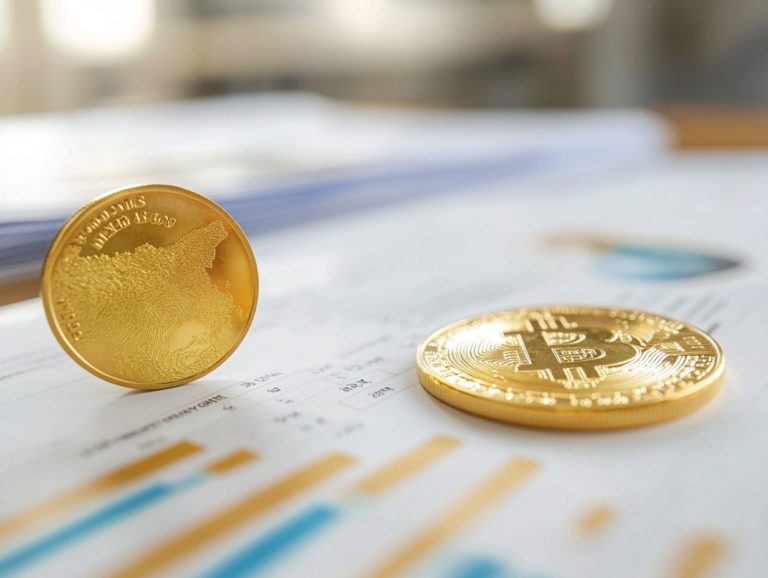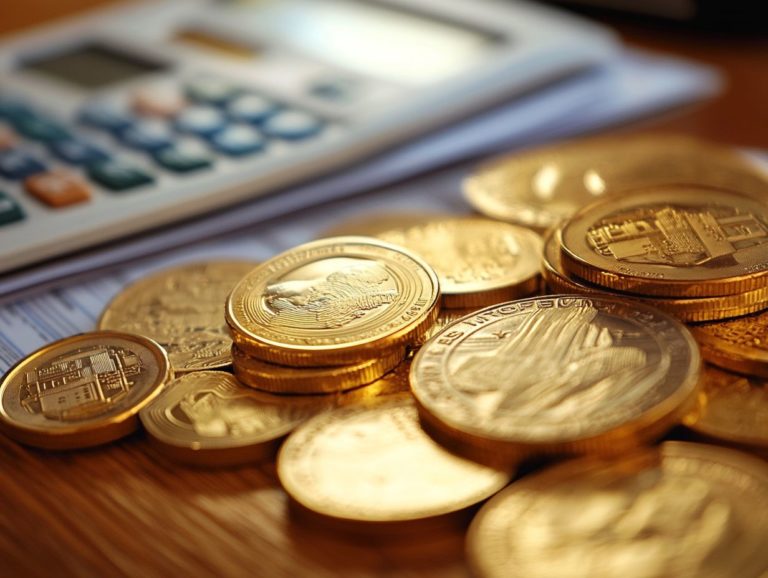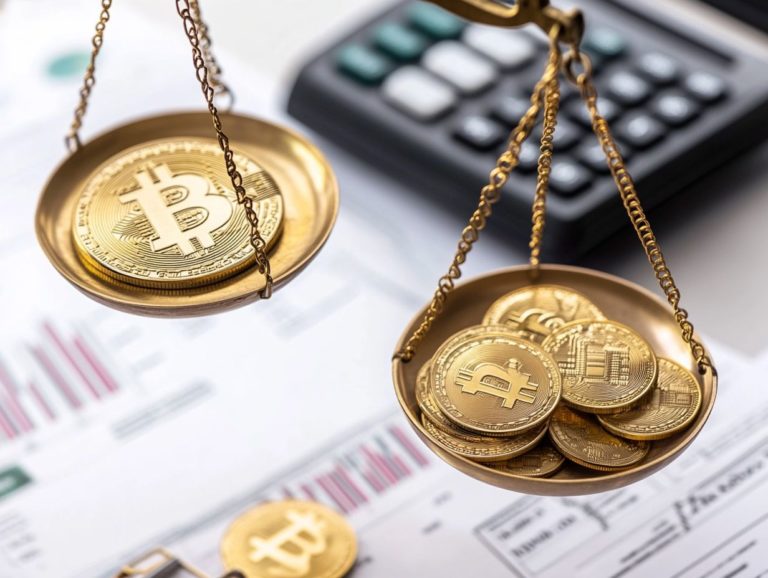The Role of Precious Metals in Estate Planning
Estate planning is essential for protecting your legacy and ensuring that your wealth transitions smoothly to future generations. Discover why precious metals are game-changers in estate planning!
A frequently overlooked element of this process is the inclusion of precious metals. By including items such as gold, silver, and platinum, you can significantly enhance your wealth diversification, safeguard against inflation, and add a layer of stability to your estate.
This article delves into the importance of precious metals in estate planning, providing valuable insights into their benefits, various types, and effective strategies for integrating them into your overall plan.
Contents
- Key Takeaways:
- The Importance of Precious Metals in Estate Planning
- Types of Precious Metals Used in Estate Planning
- How to Incorporate Precious Metals into Your Estate Plan
- Potential Risks and Considerations
- Frequently Asked Questions
- What is the role of precious metals in estate planning?
- What types of precious metals are commonly included in estate plans?
- Why are precious metals considered a good investment for estate planning?
- How are precious metals typically managed in an estate plan?
- What are the tax implications of including precious metals in an estate plan?
- How can including precious metals in an estate plan benefit future generations?
Key Takeaways:
Here s what you need to know about using precious metals in your estate plan:
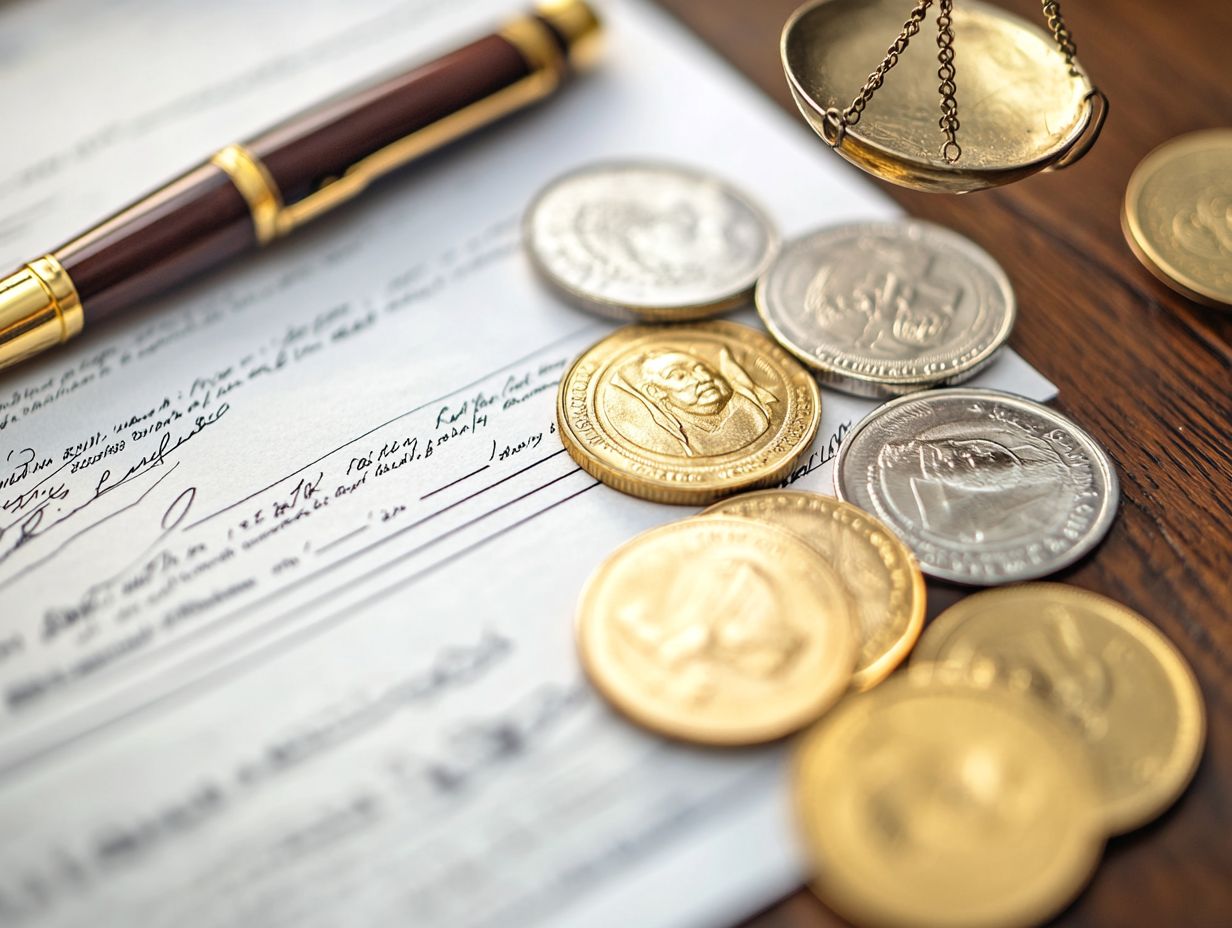
- Start diversifying your estate plan with precious metals to preserve wealth and hedge against inflation.
- Consider incorporating gold, silver, and platinum into your estate plan with the guidance of a financial advisor.
- Be mindful of potential risks such as market volatility and ensure proper storage and insurance for your precious metals.
What is Estate Planning?
Estate planning is your pathway to effectively managing and distributing your assets. It encompasses the creation of essential documents that specify how your wealth should be transferred upon your passing. This ensures that your heirs and beneficiaries receive their intended legacy in accordance with Florida law.
This process also involves important considerations such as estate taxes, capital gains tax, and the probate process, which is the legal process of distributing your estate. These factors can significantly affect your wealth preservation for both you and your family.
It s vital for you to grasp the full scope of estate planning. This isn t just about drafting wills and trusts; it also includes health care directives and powers of attorney. These documents outline your medical and financial wishes if you can t communicate them. They are pivotal in protecting your wishes regarding medical care and financial decisions should you become incapacitated.
With effective estate planning, you ensure that your assets are distributed seamlessly, aligning with your intentions and minimizing potential conflicts among heirs. Familiarizing yourself with the probate process can help you avoid lengthy delays and unexpected expenses, which could otherwise diminish the value of your estate for your loved ones.
By establishing a comprehensive plan, you can navigate the intricacies of estate taxes more effectively, safeguarding your legacy and granting yourself peace of mind.
The Importance of Precious Metals in Estate Planning
Incorporating precious metals like gold coins, gold bullion, and silver bullion into your estate planning is essential for preserving wealth. Their historical value and status as tangible personal property provide significant advantages that can help mitigate estate taxes and tax implications for your heirs and beneficiaries.
Diversification and Preservation of Wealth
Diversifying with precious metals in your estate planning is a crucial strategy for effective wealth preservation. This approach allows you to craft a balanced portfolio that safeguards against market fluctuations while ensuring your heirs and beneficiaries receive fair asset valuations.
By including a mix of asset classes, such as gold and silver, you can significantly mitigate the effects of economic downturns that typically erode the value of traditional holdings like stocks and bonds. Wealth preservation isn t just about amassing assets; it requires a nuanced understanding of how these assets interact with market trends.
As you assess the value of your diversified portfolio, proper asset valuation becomes essential. This ensures that your heirs receive an equitable inheritance, reflecting the true worth of each asset. Such foresight gives your beneficiaries the power to manage their inheritance wisely, fostering continued financial security and growth long after you re gone.
Inflation Hedge
Precious metals, particularly gold and silver, are powerful tools in estate planning. They help maintain the value of your investments and protect your wealth from inflation.
These metals often increase in value during economic downturns. This stability strengthens your financial portfolio and helps ensure future generations inherit a secure legacy.
Incorporating these assets into your estate planning creates a protective buffer against market fluctuations.
Precious metals are a trusted asset class that can play an essential role in securing your family s financial future.
Types of Precious Metals Used in Estate Planning
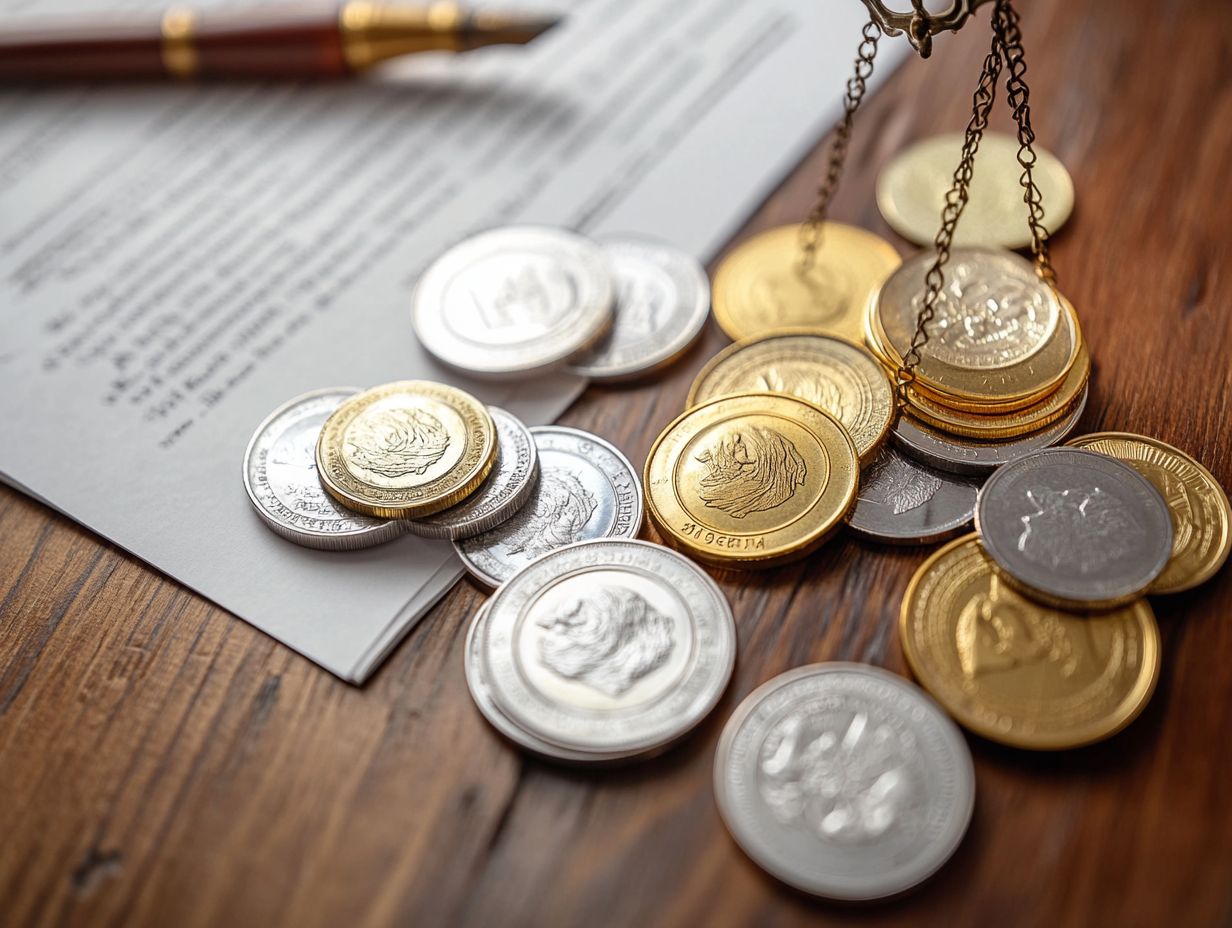
The main precious metals to consider are gold, silver, and platinum. Each has special qualities that make them valuable for preserving wealth.
Gold
Gold is often called a safe haven. Investing in gold means securing a tangible asset for your estate.
Gold comes in various forms, like coins and bars, each with benefits. Gold bullion is easy to buy or sell, while collectible coins can appreciate due to their rarity.
Gold s historical significance makes it a trusted store of value. It often performs better than other assets in tough economic times.
Including gold in your estate plan provides a strong strategy for protecting your wealth for future generations.
Silver
Silver is gaining popularity in estate planning as a valuable investment. Its tangible nature and potential for appreciation make it appealing.
This metal offers a physical asset to pass down and acts as a hedge against inflation. It can enhance your estate s financial security.
As fiat currencies fluctuate, silver remains a reliable alternative that can maintain or increase its value over time.
Recognizing silver s investment value helps safeguard your wealth and strengthens your estate’s financial future.
Platinum
Platinum is appealing in estate planning due to its rarity and investment potential. It s a great option for diversifying your asset portfolio.
This metal stands out for its resistance to corrosion and malleability. Adding platinum to your strategy can protect against inflation and economic uncertainty.
Current trends suggest that platinum prices are likely to rise. This makes it an exciting asset in your broader diversification efforts.
Explore incorporating precious metals into your estate planning to secure your financial future!
How to Incorporate Precious Metals into Your Estate Plan
Incorporating precious metals into your estate plan requires strategic decision-making and expert insight. It s crucial for you to collaborate with a financial advisor who comprehends the distinctive investment value of these metals.
This partnership empowers you to navigate the complexities of asset distribution to your heirs and beneficiaries with confidence and clarity.
Working with a Financial Advisor
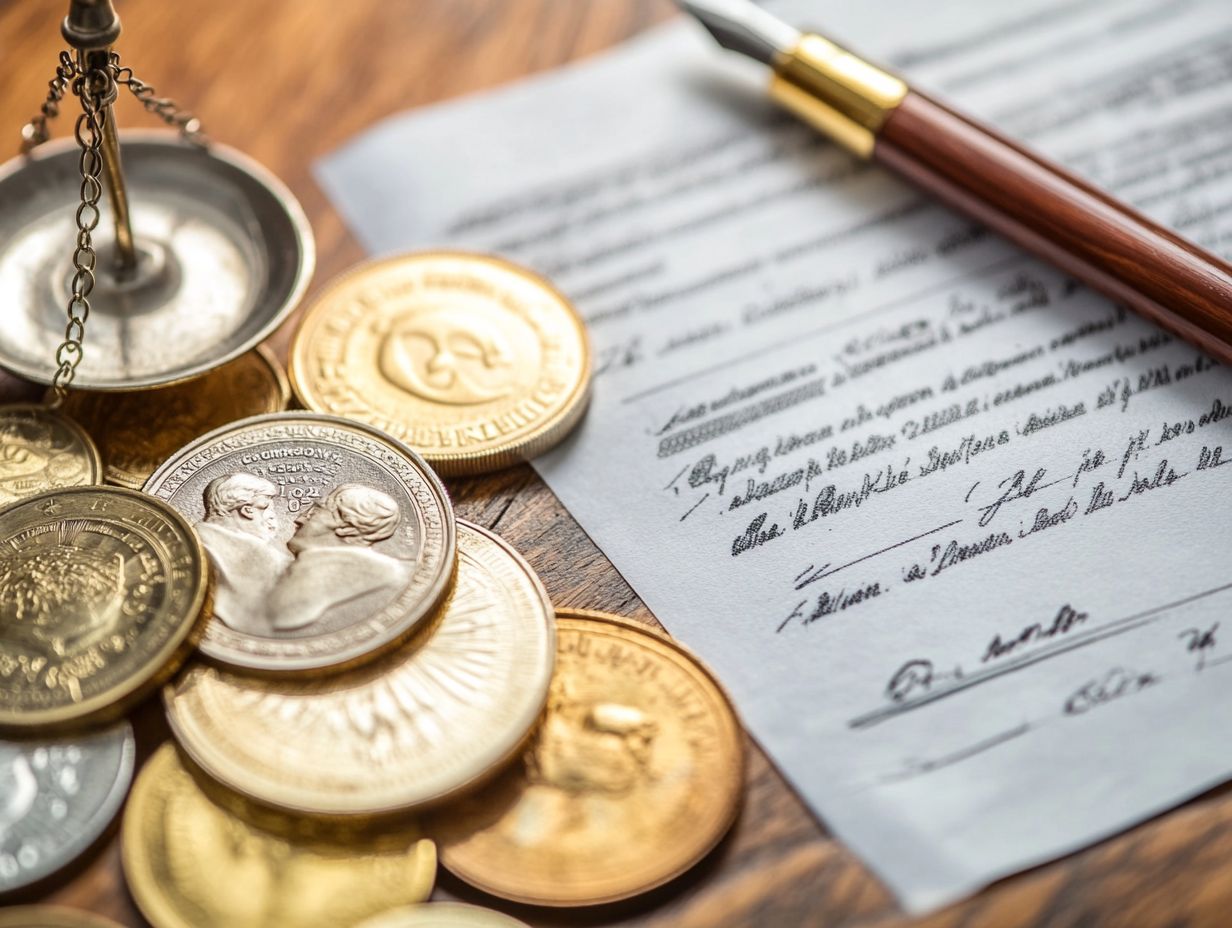
Engaging a financial advisor is essential for effectively incorporating precious metals into your estate plan. They offer invaluable insights into market trends, helping you maximize your investment value while ensuring compliance with estate planning regulations.
Their expertise helps in accurately valuing these tangible assets and discerning the best strategies for seamlessly integrating them into your broader financial framework. With tailored advice, your financial expert will guide you in selecting the right types of precious metals to invest in, be it gold, silver, or platinum, and help determine the optimal timing for acquisition or liquidation. Additionally, understanding the tax code for precious metals investments is crucial for making informed decisions.
They can also illuminate potential tax implications and succession planning details, facilitating a smoother transition of wealth to your heirs while safeguarding the integrity of your investment over time.
Choosing the Right Type and Amount of Metals
Choosing the right type and amount of precious metals for your estate plan demands thoughtful consideration of market conditions, personal financial goals, and asset valuation. This ensures that your investments retain optimal value over time.
Evaluate your investment strategies and determine how these metals can enhance your overall financial health. Remember that emerging market trends can significantly impact the value of precious metals, making it essential to stay informed about both historical patterns and future predictions.
Your unique circumstances such as liquidity needs, risk tolerance, and the legacy you wish to leave for your heirs must also play a crucial role in these decisions. By thoughtfully integrating these factors, including the role of precious metals in sustainable tax planning, you can craft a comprehensive estate plan that preserves your wealth and clearly articulates your intentions for future generations.
Potential Risks and Considerations
While precious metals can provide a wealth of benefits in your estate planning strategy, it’s essential to consider potential risks. Changes in the market, storage concerns, and the necessity for insurance are factors that deserve your careful attention.
By addressing these challenges, you can effectively protect your investment and ensure its longevity.
Market Volatility
Changes in the market can significantly impact the value of precious metals in your estate plan. Stay informed about economic trends to make the best investment choices.
This knowledge empowers you to make informed decisions about acquiring or liquidating assets, enhancing the overall strategy behind your wealth preservation efforts. Recognize that fluctuations can lead to significant shifts in the value of gold, silver, and other precious metals, making a robust estate strategy essential. Understanding the tax impact of precious metals in estate planning can be a crucial part of this strategy.
By incorporating tools like spreading out your investments to reduce risk and regular asset assessments, you can adeptly navigate the uncertainties of market dynamics.
Such foresight is invaluable in safeguarding your family wealth, ensuring that the legacy you pass down to future generations remains resilient in the face of economic turbulence.
Storage and Insurance
Proper storage and insurance of precious metals are vital for your estate planning. They ensure the security of your assets and protect against theft or loss in value.
These practices safeguard your investments. They also give you peace of mind to focus on your broader estate strategy.
Consider using safe deposit boxes at financial institutions for maximum security. Alternatively, select specialized home safes for substantial protection.
Insurance policies tailored for precious metals can boost your security. They cover theft, damage, or market fluctuations.
Incorporate these strategies into your estate planning. You ll feel confident knowing your valuable assets are safe and secure.
Frequently Asked Questions
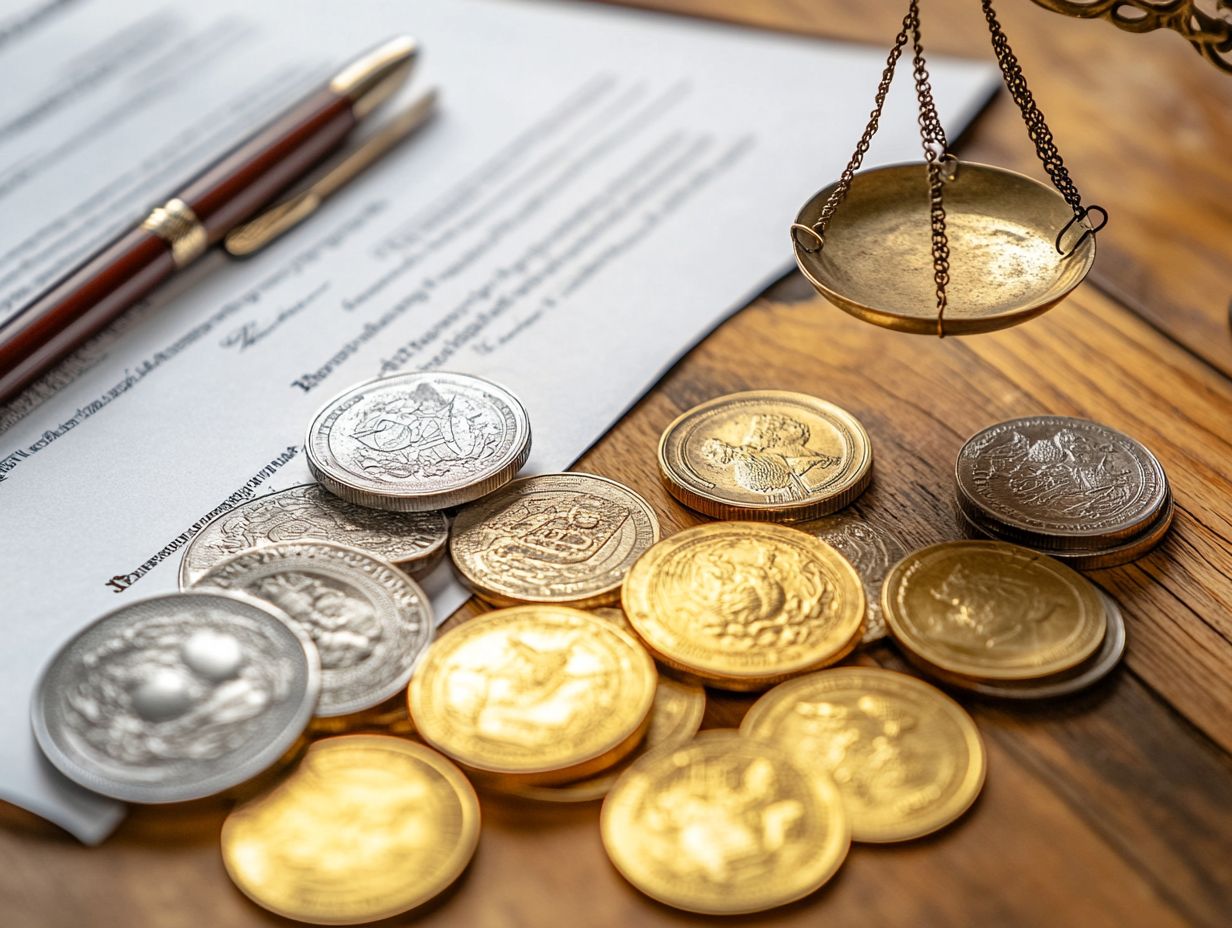
What is the role of precious metals in estate planning?
Precious metals can serve as valuable assets in an estate plan. They provide diversification and protect against rising prices and economic uncertainty.
What types of precious metals are commonly included in estate plans?
Gold, silver, platinum, and palladium are the most common precious metals included in estate plans. These metals hold their value over time.
Why are precious metals considered a good investment for estate planning?
Precious metals have historically maintained their value, making them reliable for estate planning. They offer potential for long-term growth, preserving wealth.
How are precious metals typically managed in an estate plan?
You can hold precious metals physically as coins or bars, or in a precious metals IRA (Individual Retirement Account). They can also be included in a trust or willed to specific individuals.
What are the tax implications of including precious metals in an estate plan?
The tax implications depend on how the metals are held and transferred. It s essential to consult a tax professional to understand these implications.
How can including precious metals in an estate plan benefit future generations?
Precious metals serve as tangible assets that can be passed down through generations. They offer financial security and may increase in value over time.
Start planning your estate with precious metals today for a secure tomorrow!










